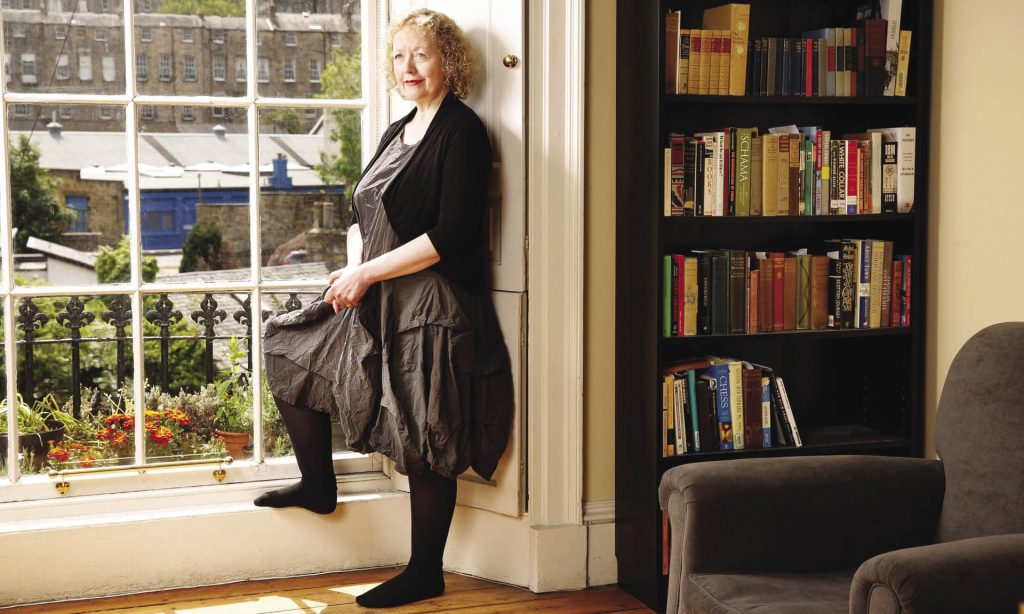Why the Goldsmith award winning book Ducks, Newburyport is worth the struggle to read

Lucy Ellman, author of the Goldsmith award winning novel may be the daughter of a modernist scholar, but proves she’s a modernist in her own right with Ducks, Newburyport. Photo courtesy of The Guardian
By Andi Endruhn, Publishing Editor
The fact that it was glowing tomato-red from the shelf when I saw it. The fact that it was approximately the size of a phonebook (if I remember what those look like). The fact that it had a title that seemed to be absolute nonsense: Ducks, Newburyport. The fact that it is an endless cavalcade of, “The fact that, the fact that, the fact that,” repeating throughout the entirety of its 1,020 pages, pulling you into a trance as you learn about the inner workings of a middle-aged housewife in Ohio and a mountain lion who interrupts every now and then. The fact that the entire novel is one sentence encompassing the entirety of life. The fact that Ducks, Newburyport is a challenge, a brain-teaser, a puzzle, an encyclopedia of one woman’s thoughts on the world — a rule-breaking meditation on what the difference is between poetry and prose and a labour of love.
Confession: I haven’t finished the book yet. I don’t know how it ends. I hope you can forgive me, because the more I read, the more breaks I take and the more I find myself realizing that Lucy Ellman’s monolithic work isn’t a book, it’s a project.
Ellman isn’t unfamiliar with the idea of a mind-bending narrative. Nor is she a stranger to the kind of novel writing that dabbles in poetry, which makes Ducks an endeavour to read. In fact, you could consider her the natural successor to the literary tradition of a make-work project. Her father, Richard Ellman, is one of the foremost biographers of the Irish literary giant and narrative experimentalist, James Joyce. One of Joyce’s most notable works being Ulysses, a book, that for many, is much more fun to brag about reading than it is to actually read, as it meanders through the day of a travelling salesman across 730 pages.
For all the terrible times I have picked up Ulysses to be stymied by Joyce’s predilection to word games, I’ve found myself doing the same with Ducks. The nearly meditative nature of repetition makes your eyes glaze over, forcing you back up the page to feel as though you haven’t missed anything at all. Other times, I’ve found myself riveted late into the night as the unnamed woman (and the intervening mountain lion, whose connection is never explicitly explained) tells me that, “the fact that we all go on pretending things are fine, hoping everything’s a-okay, even though everything is nowhere near okay and we all know it, no matter how many candlelit vigils you hold.”
Like many reviews of the book that suggest that Ellman’s point could be made in a quarter as many pages, my point could be distilled down to one simple point: this book is work. And it’s frustrating, wonderful work to do.

This book is an endless cavalcade of, “The fact that, that fact, the fact,” repeating throughout the entirety of its 1,020 words. Graphic by Andi Endruhn
I read for enjoyment. I pick up a book or turn on a movie to jump into another life for a moment and escape from the drudgery of school work and the stress of being 20-something with an impending leap into the working world. My life is work, just as anyone’s is. Ellman’s depiction of this unnamed woman is so all-encompassing, forcing you to learn about her life, her cancer treatments, her children, the snippets of poetry and music that stick in her head, her thoughts on politics and the pies that she makes in her kitchen. And so, it’s work.
Just like life, amongst the mundane and banal, is the discovery of simple and beautiful truths that keep you going. Its work in the same way that a new hobby, an interesting class or solving a new puzzle is. The joy of pushing your way through the never-ending obstacles that make up your life, is the same as pushing your way through the never-ending pages of dense text.
Life isn’t broken by paragraphs and chapters, nor is it an easy task to make your way through, and as I find myself descending deeper and deeper into the endless — and maddening — task of reading (with generous breaks and time for frustration), the fact that there is joy in that kind of struggle makes both this novel, and my life imminently more worth living.



